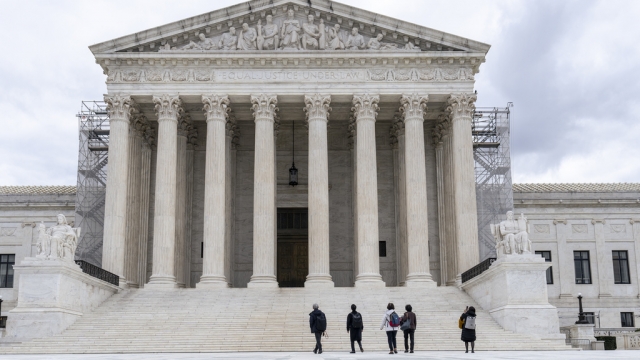WASHINGTON, D.C. — A divided Supreme Court on Tuesday lifted a stay on a Texas law that gives police broad powers to arrest migrants suspected of crossing the border illegally, while a legal battle over immigration authority plays out.
The Biden administration is suing to strike down the measure, arguing it’s a clear violation of federal authority that would hurt international relations and create chaos in administering immigration law.
Texas has argued it has a right to take action over what Gov. Greg Abbott has described as an “invasion” of migrants on the border.
A similar bill in Arizona, SB1231, went to Governor Katie Hobbs’ desk this month.
Hobbs vetoed the measure saying the bill “presents significant constitutional concerns.”
Arizona Republican Senators promised to keep bringing their version of the Texas bill back.
Senate President Warren Petersen released a statement Tuesday in response to the SCOTUS action:
"The Arizona Governor has vetoed legislation that would have given Arizona's law enforcement the ability to protect our citizens from the invasion occurring at the southern border. The U.S. Supreme Court's decision to allow Texas' S.B.4 to go into effect shows that the Governor's veto was rash and hasty," Petersen said. "She will soon have the opportunity to do the right thing, as we will give her another chance to sign this bill into law to protect Arizonans from border-related crimes."
US Representative Raúl Grijalva released a statement in opposition:
"The decision by the Supreme Court to allow this xenophobic and anti-immigrant law to take effect is blatantly unconstitutional and inhumane. It’s an unconscionable ruling that, if upheld, will have untold consequences for migrants, asylum seekers, and our rule of law,” Grijalva said. “It is another ruling that ignores clear precedent, enables a racist political agenda, and reaffirms that elections matter. I support the Biden administration’s appeal in the 5th Circuit to strike down this cruel law.”
Latest 48 Hours on the Border coverage:
Ride along with Yuma Border Patrol as new policies take shape Arizona nonprofit says FEMA still owes them close to $3 million Regional Center for Border Health plans hospital for underserved part of AZ Despite border challenges, Yuma relies on migrants to power agriculture industry New border policies lead to major decrease in illegal border crossings in YumaIn Texas, opponents have called the law, known as Senate Bill 4, the most dramatic attempt by a state to police immigration since an Arizona law more than a decade ago, portions of which were struck down by the Supreme Court. Critics have also said the Texas law could lead to civil rights violations and racial profiling.
A federal judge in Texas struck down the law in late February, but the 5th Circuit Court of Appeals quickly stayed that ruling, leading the federal government to appeal to the Supreme Court.
The majority did not write a detailed opinion in the case, as is typical in emergency appeals. But the decision to let the law go into effect drew dissents from liberal justices Ketanji Brown Jackson, Elena Kagan and Sonia Sotomayor.
Two of the conservative justices, Amy Coney Barrett and Brett Kavanaugh, wrote a concurring opinion indicating the 5th U.S. Circuit Court of Appeals could block the measure again, and either side can return to the Supreme Court once the 5th Circuit acts.
The battle over the Texas immigration law is one of multiple legal disputes between Texas officials and the Biden administration over how far the state can go to patrol the Texas-Mexico border and prevent illegal border crossings.
Several Republican governors have backed Gov. Greg Abbott’s efforts, saying the federal government is not doing enough to enforce existing immigration laws.
The Supreme Court in 2012 struck down key parts of an Arizona law that would have allowed police to arrest people for federal immigration violations, often referred to by opponents as the “show me your papers” bill. The divided high court found then that the impasse in Washington over immigration reform did not justify state intrusion.




